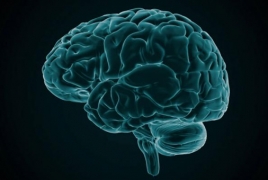Brain scans show promise in spotting suicidal thoughts May 3, 2019 - 14:54 AMT PanARMENIAN.Net - Carnegie Mellon psychology professor Dr. Marcel Just has spent decades developing a sophisticated system to try to read your minds. Now, he's making a breakthrough into suicidal thinking, CBS reports. "We found that there were certain concepts that were altered in people who thought about suicide," Just told CBS News' Nikki Battiste. "And our method was able to detect those differences and analyze exactly what the differences consist of." His method begins with a sophisticated piece of equipment: a functional MRI. With fMRI you see a picture of the brain's activity. It tracks neurons firing in the brain as a person thinks about an object or a concept. In other words, every thought or idea in our brain has its own specific pattern. What Just found is that those patterns are similar across many people — unless you have suicidal thoughts. "That's what psychiatric illnesses do. They change the way you think. And this method can, I think, identify those changes," he said. When comparing two scans of people's brains thinking about the word "death," you get different results in a person who has thought about suicide and one who has not. In the scan imagery, red represents activation of the brain related to self-thinking. Among people who have attempted suicide, there's even more of the dark red. Thirty-four people took part in Dr. Just's latest study. Half of them never had suicidal thoughts, but the other 17 had, and over half of those 17 had even attempted suicide in the past. The participants were asked to think about 30 different concepts like "carefree," "praise" and "death" while their brain activity was tracked in the fMRI. The results were second-by-second snapshots of brain patterns that were then analyzed by a complex computer server, storing hundreds of thoughts by hundreds of people, with the power to search for unique patterns. "We can tell whether someone's feeling anger or happiness or sadness. We can tell what number a person's thinking," Just said. "We can tell what topic a person is reading a paragraph about." Just's method was 90 percent accurate in determining who had past suicidal thoughts and attempts. Dr. Joshua Gordon, director of the National Institute of Mental Health, thinks his work could lead to more effective treatment. "If we could understand the neurobiology underlying the drive to harm one's self then we would be able to design better therapies aimed at reducing that desire," Gordon said. "The treatments that we have now don't work all that well." Azerbaijani authorities report that they have already resettled 3,000 people in the Nagorno-Karabakh town of Stepanakert. On June 10, Azerbaijani President of Azerbaijan Ilham Aliyev will leave for Turkey on a working visit. Azerbaijani President Ilham Aliyev arrived in Moscow on April 22 to hold talks with Russian counterpart Vladimir Putin. Authorities said a total of 192 Azerbaijani troops were killed and 511 were wounded during Azerbaijan’s offensive. Partner news |